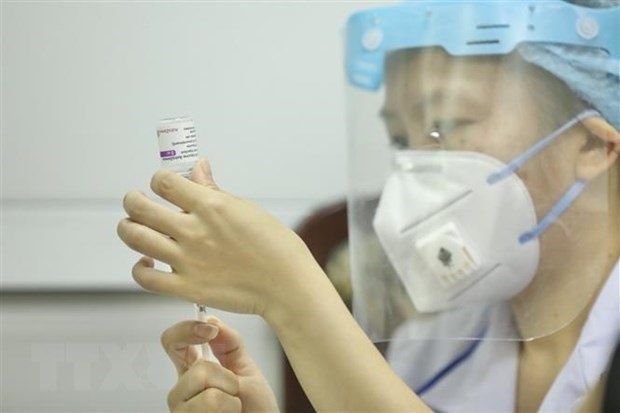Prospects narrow for homemade COVID-19 vaccines
 |
| Prospects narrow for homemade COVID-19 vaccines, (Photo: VNA) |
Do Xuan Tuyen, Deputy Minister of Health, said at a government press briefing in early April that the ministry (MoH) still wants to grant licences for successful vaccines.
“The three candidates are in clinical trials. When they finish documents as required by the National Ethics Council for Biomedical Research, and, based on their appraisal, the MoH will grant the license for them if they meet all of the conditions,” he added. “These vaccines need to ensure high-level safety and have sufficient and comprehensive study and appraisal to prevent possible accidents.”
Since the early stage of the pandemic outbreak, the MoH directed units and agencies to study COVID-19 vaccines. From there, Nano Covax, Covivac, and ARCT-154 appeared on the scene.
Nano Covax, developed by Nanogen Pharmaceutical Biotechnology JSC, has experienced third-phase clinical trials, with the first trial shot administered in December 2020. Nanogen is continuing to collect and supplement data for the Advisory Council for Licensing of Drugs and Pharmaceutical Materials.
“According to the research proposal, the advisory council will continue to have meetings with Nanogen. If Nano Covax meets the requirements, the council will submit to the MoH for licensing the vaccine,” Tuyen elaborated.
Meanwhile, Covivac is completing documents for third-phase trials. Developed by the Institute of Vaccines and Medical Biologicals (IVAC) in the central city of Nha Trang, research began in May 2020.
Elsewhere, ARCT-154 was the first mRNA technology vaccine in Vietnam developed by US company Arcturus Therapeutics, which transferred the technology to VinBioCare, a member company of Vingroup. This vaccine quickly moved from first-phase to third-phase trials from August to October 2021, and has administered clinical trial 3B on over 1,000 volunteers.
All in all, the candidates have failed to meet their original research roadmap. Nanogen planned to bring its vaccine to the market in 2021 with the aim of producing 10 million doses a month, and then increasing to 30 million doses a month in early 2022. Meanwhile, IVAC aimed to make the vaccine available on the market in late 2021 or early 2022.
Early in 2020, four units joined the race for a home-grown vaccine, including Vabiotech, one of Vietnam’s leading pharmaceutical companies. Also involved was the Centre for Research and Production of Vaccines and Medical Biologicals (Polyvac), IVAC, and Nanogen.
To support the research and development of locally-made vaccines, the government asked the MoH, the Ministry of Science and Technology, the Ministry of Finance, and other agencies to facilitate the process. Specifically, the prime minister asked them to work on the supporting rate for research and development, as well as invest in increasing production capacity on a faster scale.
Despite this, Covivac ceased work after the second phase clinical trial and delayed the third, with a representative of the research team saying they found it difficult to find enough volunteers for the third phase. Polyvac and Vabiotech also stopped pre-clinical research of their vaccine.
This slow progress, along with the successful coverage of COVID-19 vaccinations in general in the country, means the motivation to get local vaccines rushed to the market is simply not there anymore, according to experts.
According to the MoH, Vietnam has vaccinated over 210 million doses of the vaccines, so if any candidates complete their research and get approval for use, they could be used for booster shots instead. In this situation, they will need clear guidance from the ministry for their next steps.
The Covivac research team representative explained they considered changing the research of the vaccine towards booster shots. However, the mechanism for getting approval for emergency use is not yet clear, he added, hence delaying third-phase clinical trials.
What the stars mean:
★ Poor ★ ★ Promising ★★★ Good ★★★★ Very good ★★★★★ Exceptional
 Tag:
Tag:
Themes: Healthcare Platform
- PM outlines new tasks for healthcare sector
- Opella and Long Chau join forces to enhance digestive and bone health
- Hanoi intensifies airport monitoring amid Nipah disease risks
- Cosmetics rules set for overhaul under draft decree
- Policy obstacles being addressed in drug licensing and renewal
Related Contents
Latest News
More News
- Hanoi intensifies airport monitoring amid Nipah disease risks (January 29, 2026 | 15:21)
- 14th National Party Congress wraps up with success (January 25, 2026 | 09:49)
- Congratulations from VFF Central Committee's int’l partners to 14th National Party Congress (January 25, 2026 | 09:46)
- List of newly-elected members of 14th Political Bureau announced (January 23, 2026 | 16:27)
- 14th Party Central Committee unanimously elects To Lam as General Secretary (January 23, 2026 | 16:22)
- List of members of 14th Party Central Committee announced (January 23, 2026 | 09:12)
- Highlights of fourth working day of 14th National Party Congress (January 23, 2026 | 09:06)
- Press provides timely, accurate coverage of 14th National Party Congress (January 22, 2026 | 09:49)
- Press release on second working day of 14th National Party Congress (January 22, 2026 | 09:19)
- Minister sets out key directions to promote intrinsic strength of Vietnamese culture (January 22, 2026 | 09:16)






















 Mobile Version
Mobile Version